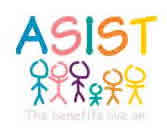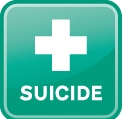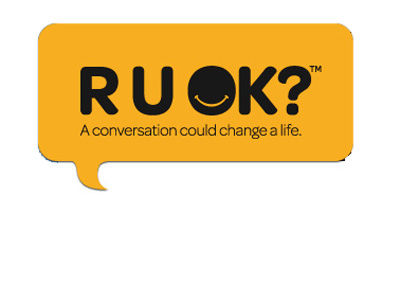RU OK?
20/01/12 05:33
I see life from a religious perspective. I understand humans to be created with a purpose. But even if one has no particular religious perspective, the reality that we are capable of love and compassion bears reflection. If the world is just about survival, then being able to enter into a relationship that puts the other first must be essential to our survival. But as I said, I see it from a religious perspective. I believe that we humans exist to care for one another.
Caring for others, it seems, must start with keeping each other alive. It means going a step farther than “You shall not commit murder.” Keeping each other alive is the reason that millions have received first aid training. Knowing what to do in an emergency can make a big difference when an accident or sudden illness occurs. I was in my twenties back in the 1970’s when I first took a CPR class. Within a few years I had an opportunity to use my skills when a colleague suffered a heart attack and the ambulance was ten of fifteen minutes away. Fortunately in that situation there were others who also were trained and who responded appropriately.
Cardiopulmonary resuscitation (CPR) is a lifesaving technique useful in many emergencies, including heart attack and near drowning, in which someone’s breathing or heartbeat has stopped. Every hospital in our nation has personnel who are trained in the latest techniques. Every first responder who is dispatched by 911 is trained in CPR. In addition to these professionals, millions of everyday citizens have received training in this lifesaving technique.
The simple truth, however, is that there are other threats to life than just heart disease, drowning or stroke. People die of other preventable causes. The average person is more likely to encounter someone who is thinking of suicide than someone who is having a heart attack. In all 105 countries that report cause of death to the World Health Organization, suicide is one of the top three causes of death among people aged 15-35 years. It just makes sense for communities to have standardized training to enable people to be able to respond effectively to a suicide threat.
That training is available. Applied Suicide Intervention Skills Training (ASIST) is widely recognized as effective training that enables caregivers to help prevent the immediate risk of suicide. There is no doubt that millions of lives could be saved if communities could provide ASIST training for emergency responders and everyday citizens.
It takes longer to learn ASIST techniques than CPR. ASIST requires a full two days for initial training. Like CPR, ASIST requires periodic refresher training.

As a citizen in a community where the suicide rate is 2½ times the national average, it just made sense for me to receive ASIST training and to keep current. So receiving the training was the focus of yesterday and today for me. Like other things pastors do, it doesn’t mean that I can totally set aside my other responsibilities. I had to do some chores, like preparing my part of worship bulletins and outlining my sermon, earlier in the week than usual. I had to rearrange my schedule, even moving one meeting to my day off. Unlike some of the other participants in the training, I had to make a hospital call after yesterday’s training concluded. But the training is worth it.
It is not that I had no skills for suicide intervention prior to the workshop. My career and my love for others have already brought me to a place where I needed to intervene on several occasions. Without ASIST training, however, I had to develop my own techniques. I have dubbed my prior style “persistent referral.” When I discovered that someone was thinking of suicide I simply stayed with that person until together we could get more help for that person. I have learned that whenever someone says to me, “Don’t tell anyone else, but . . .” I will be spending whatever time is required to convince that person that we have to tell someone else. As a pastor, we start by telling God. Since God already knows, a prayer can be a good way to practice telling. But it cannot stop there. I keep a page of referral phone numbers and other resources with me whenever I am working with other people. I work to nurture relationships with counselors and other health care professionals so that when help is needed I know where we can go.

ASIST training will provide me with additional skills and techniques that I can use the next time I am with someone who is considering taking active steps to end his or her life. ASIST is research-based. It is the most widely used suicide intervention program in the world and has been proven to be effective. On-going studies are constantly providing additional information and improvements to the training.
In my work as a pastor, I have received strong support from the congregations I serve for my on-going involvement in suicide prevention work. I still encounter people who are not comfortable talking about suicide. I still encounter the stigma that is attached to mental illness and to suicide. I still encounter old religious notions that are judgmental of those who are at risk for suicide. But those things take a back seat to genuine concern and support for suicide-prevention work. I am not the first member of our congregation to receive ASIST training. Our church has already hosted trainings on several occasions.
Sadly, however, there aren’t enough people who have received the training. Too few of my colleagues are willing to take the time for the training. Some of them don’t think they need the training. They feel that the general pastoral counseling training they received in seminary is sufficient.
So I am likely to spend more time on my soapbox in the coming years. I think it is as important to have ASIST trained people at church camps and conferences, as it is to have folks trained in CPR.

But until that day, there is another thing that anyone can do. Everyday people can save lives by just showing that they care. Asking the question, “Are you OK?” and listening to the answer can make a huge difference in another person’s life. For several years we have participated in the RU OK program for youth and we have posters and stickers up all around our church building.
So my question for each reader of today’s blog is this: “Are you OK?” If not, please get some help. If so, please ask someone else, “Are you OK?”
I really believe we were created to care for one another.
Caring for others, it seems, must start with keeping each other alive. It means going a step farther than “You shall not commit murder.” Keeping each other alive is the reason that millions have received first aid training. Knowing what to do in an emergency can make a big difference when an accident or sudden illness occurs. I was in my twenties back in the 1970’s when I first took a CPR class. Within a few years I had an opportunity to use my skills when a colleague suffered a heart attack and the ambulance was ten of fifteen minutes away. Fortunately in that situation there were others who also were trained and who responded appropriately.
Cardiopulmonary resuscitation (CPR) is a lifesaving technique useful in many emergencies, including heart attack and near drowning, in which someone’s breathing or heartbeat has stopped. Every hospital in our nation has personnel who are trained in the latest techniques. Every first responder who is dispatched by 911 is trained in CPR. In addition to these professionals, millions of everyday citizens have received training in this lifesaving technique.
The simple truth, however, is that there are other threats to life than just heart disease, drowning or stroke. People die of other preventable causes. The average person is more likely to encounter someone who is thinking of suicide than someone who is having a heart attack. In all 105 countries that report cause of death to the World Health Organization, suicide is one of the top three causes of death among people aged 15-35 years. It just makes sense for communities to have standardized training to enable people to be able to respond effectively to a suicide threat.
That training is available. Applied Suicide Intervention Skills Training (ASIST) is widely recognized as effective training that enables caregivers to help prevent the immediate risk of suicide. There is no doubt that millions of lives could be saved if communities could provide ASIST training for emergency responders and everyday citizens.
It takes longer to learn ASIST techniques than CPR. ASIST requires a full two days for initial training. Like CPR, ASIST requires periodic refresher training.

As a citizen in a community where the suicide rate is 2½ times the national average, it just made sense for me to receive ASIST training and to keep current. So receiving the training was the focus of yesterday and today for me. Like other things pastors do, it doesn’t mean that I can totally set aside my other responsibilities. I had to do some chores, like preparing my part of worship bulletins and outlining my sermon, earlier in the week than usual. I had to rearrange my schedule, even moving one meeting to my day off. Unlike some of the other participants in the training, I had to make a hospital call after yesterday’s training concluded. But the training is worth it.
It is not that I had no skills for suicide intervention prior to the workshop. My career and my love for others have already brought me to a place where I needed to intervene on several occasions. Without ASIST training, however, I had to develop my own techniques. I have dubbed my prior style “persistent referral.” When I discovered that someone was thinking of suicide I simply stayed with that person until together we could get more help for that person. I have learned that whenever someone says to me, “Don’t tell anyone else, but . . .” I will be spending whatever time is required to convince that person that we have to tell someone else. As a pastor, we start by telling God. Since God already knows, a prayer can be a good way to practice telling. But it cannot stop there. I keep a page of referral phone numbers and other resources with me whenever I am working with other people. I work to nurture relationships with counselors and other health care professionals so that when help is needed I know where we can go.

ASIST training will provide me with additional skills and techniques that I can use the next time I am with someone who is considering taking active steps to end his or her life. ASIST is research-based. It is the most widely used suicide intervention program in the world and has been proven to be effective. On-going studies are constantly providing additional information and improvements to the training.
In my work as a pastor, I have received strong support from the congregations I serve for my on-going involvement in suicide prevention work. I still encounter people who are not comfortable talking about suicide. I still encounter the stigma that is attached to mental illness and to suicide. I still encounter old religious notions that are judgmental of those who are at risk for suicide. But those things take a back seat to genuine concern and support for suicide-prevention work. I am not the first member of our congregation to receive ASIST training. Our church has already hosted trainings on several occasions.
Sadly, however, there aren’t enough people who have received the training. Too few of my colleagues are willing to take the time for the training. Some of them don’t think they need the training. They feel that the general pastoral counseling training they received in seminary is sufficient.
So I am likely to spend more time on my soapbox in the coming years. I think it is as important to have ASIST trained people at church camps and conferences, as it is to have folks trained in CPR.

But until that day, there is another thing that anyone can do. Everyday people can save lives by just showing that they care. Asking the question, “Are you OK?” and listening to the answer can make a huge difference in another person’s life. For several years we have participated in the RU OK program for youth and we have posters and stickers up all around our church building.
So my question for each reader of today’s blog is this: “Are you OK?” If not, please get some help. If so, please ask someone else, “Are you OK?”
I really believe we were created to care for one another.